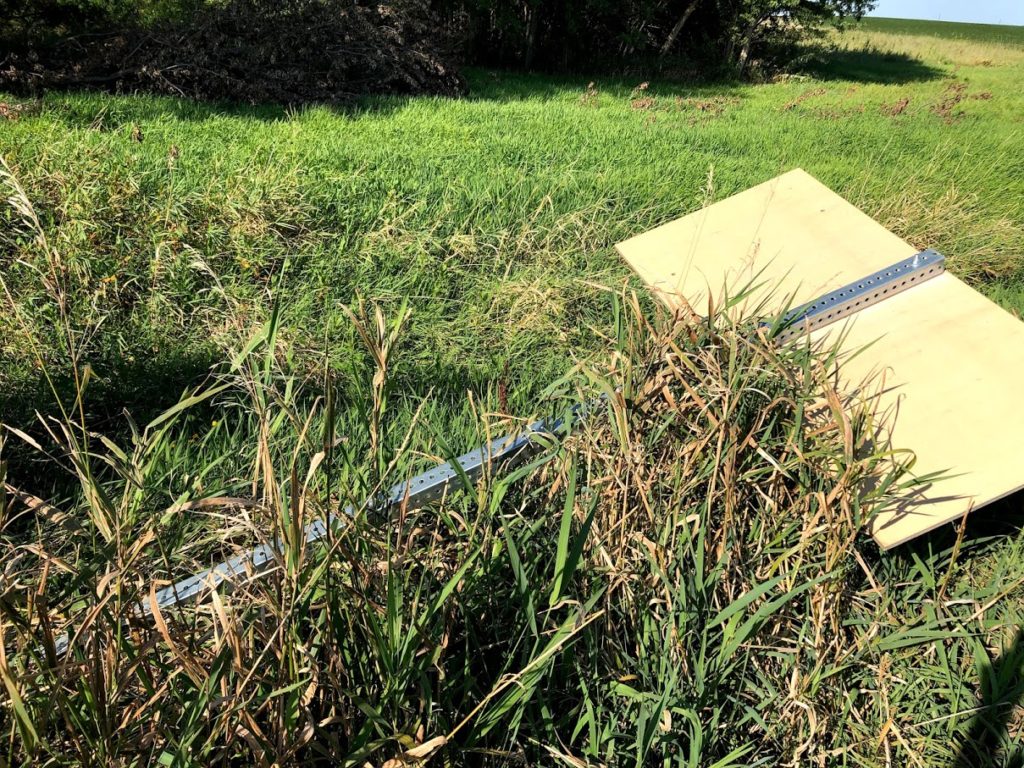Learning the name of a person is a first step to building a relationship with them. It’s the same way with natural features. Learning to distinguish and name Iowa’s species of trees and wildflowers helped me me deepen my awareness of the landscape and seasons. That’s the thinking behind the road signs we helped Story County install, marking the creek crossings and watershed boundaries. Once you know the name of a creek and where it flows, you pay a bit more attention to it. If you begin to see the creek as something more than a garbage dump or drainage system, maybe you’ll take some steps at your home, farm, or business to make the water cleaner.
Now, the name of one of those signs is a word that is disrespectful to Native Americans. We apologize for perpetuating its use. We are delighted to hear that the U.S. Board of Geographic Names has approved changing the name of “Squaw Creek” to “Ioway Creek.” We commend the Story County Supervisors, Ames City Council, and others who pushed for this issue. It will take a little time and effort to change the signs, the logo and legal documents for the Watershed Management Authority, and our habits, but it’s a necessary and overdue change.

If you’re inclined to roll your eyes at this “political correctness,” hear me out. My white Norwegian-American elders did not share stories of racism and oppression, but they did teach me about pride in our heritage and showing respect for others. And since I have a hard-to-pronounce last name, I understand that when people take the trouble to get a name right, it’s a sign of courtesy.
The settlers who adopted the word “squaw” for place names did not take the trouble to get it right. According to a group that works to preserve indigenous languages:
“Squaw” is not an Indian word. It was probably invented by European colonists who could not pronounce a longer Indian word… The likeliest thing is that those original colonists were not being insulting and were just trying and failing to use an Indian word for “woman.” … However, since then the word has been used in a very racist and sexually abusive way, so it definitely has negative implications now.
-Native Languages of the Americas
Here’s a little thought experiment for white Iowans who enjoy, as I do, the celebrations of Dutch heritage in Pella, Norwegian heritage in Story City, etc. Imagine that there was no-one of Norwegian heritage left in Story City. Imagine they had all been killed or driven out generations ago, and there was no one left there to celebrate Syttende Mai, or paint rosemaling, or roll lefse, or bake sandbakkels. Imagine that instead of being celebrated in the town square, those customs had been suppressed by the US government and religious schools, and had only recently been revived by my Norwegian-American community in exile. Suppose that all that remained to acknowledge that Norwegian immigrants once lived here was a creek or housing development named “Sunbucker,” a corruption of the dessert “sandbakkel”, now understood to mean “those backward people.” Suppose I’d grown up being called a “Dirty Sunbucker” or worse because of my ethnicity. How would I feel about these place names? Uff da! Would I appreciate if people showed me the courtesy of using Norwegian words correctly, and talking about my ancestry without resorting to crude stereotypes? You betcha! It’s a silly analogy for a traumatic history, but you get the point.
At this point the etymology of the word “squaw” is beside the point.
“It’s not a positive term. The continued use of it is not appropriate and disrespectful to the people of native tribes.”
-Lawrence Spottedbird, executive director at Meskwaki Nation, as quoted in the Gazette
If you can bring yourself to change your seed cap from “Monsanto” to “Bayer” over a corporate merger, surely you can get used to saying a different creek name to show a little more respect for the people who used to live in Story, Boone, and Hamilton County (the Iowa or Bah-kho-je people) and to avoid insulting our Meskwaki neighbors.
Recently, the students of Newton High School, having cleaned up their neighborhood creek, campaigned to change its name from Sewer Creek to Cardinal Creek. It was a way of changing the way people thought about the place. Water matters to us. Names matter too.
